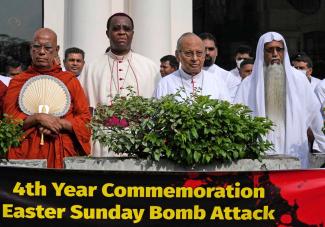Interreligious dialogue
“Dialogue of life”
 picture alliance / ASSOCIATED PRESS / Eranga Jayawardena
Representatives of various religions jointly commemorated the fourth anniversary of the serious bomb attacks on Catholic churches in Colombo, Sri Lanka on Easter Sunday 2019.
picture alliance / ASSOCIATED PRESS / Eranga Jayawardena
Representatives of various religions jointly commemorated the fourth anniversary of the serious bomb attacks on Catholic churches in Colombo, Sri Lanka on Easter Sunday 2019.
In the 1980s, the government under Junius Richard Jayewardene opened up the country’s economy. As a result, farmers and the working class were increasingly exploited by the elites. The government welcomed multinational corporations and businesses, further marginalising the local population.
In many regions, people were suffering. Michael Rodrigo visited the district of Monaragala in the south of the country to find a solution and initiate a local paradigm shift for people-centred development. He lived among the Buddhist majority of the region and worked as a Christian for their wellbeing.
Socio-political approach
Rodrigo worked with the local people to create self-reliant and independent living conditions. He introduced a natural fertilisation system, equal education programmes, herbal medicine (Ayurveda treatments), education programmes, healthcare, housing projects for the poor and much more as part of a Buddhist-Christian dialogue.
He never overemphasised his identity as a Catholic priest or Christian. He wanted to be defined by his work. His practice of dialogue was liberating for the Buddhist community. Rodrigo primarily chose a social approach, but his endeavours always had religious undertones.
Rodrigo was assassinated during the second uprising of the Janatha Vimukthi Peramuna (JVP), a local Marxist-Leninist party, against the government in the late 1980s. His assassination signalled a serious decline in civil-society activities in rural areas. From then on, a different paradigm was introduced by the central government’s right-wing approach. During this dark period, many young people, intellectuals and activists were killed or disappeared.
The events were the result of violence encouraged by the central government by invoking the Sinhala Buddhist mentality. The leftist parties also responded with violence. The negative effects of these episodes linger on as the remnants of the misguided paradigms of the late 1980s still influence the country’s systems today.
Rehan Fernando is a Sri-Lankan author. He is currently pursuing two PhDs in interreligious dialogue and ecological theology.
rehansirinimal@gmail.com

